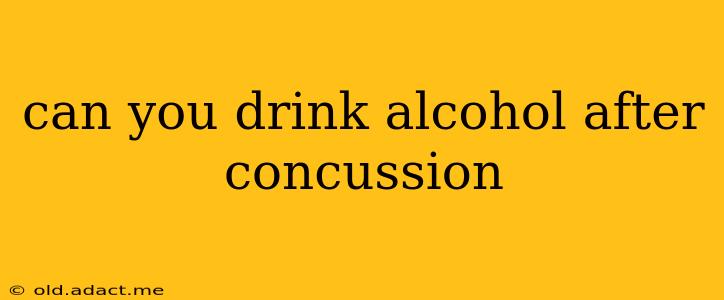Experiencing a concussion can be jarring, both physically and mentally. Recovery is crucial, and many wonder about the impact of alcohol on the healing process. The simple answer is: no, you should not drink alcohol after a concussion. Alcohol can significantly hinder recovery and even worsen the effects of your injury. This guide will delve into the reasons why, exploring the potential consequences and offering advice for safe recovery.
Why Should You Avoid Alcohol After a Concussion?
Alcohol is a central nervous system depressant. This means it slows down brain activity. After a concussion, your brain is already vulnerable and trying to heal from the trauma. Consuming alcohol adds another layer of stress, potentially slowing down the healing process and increasing the risk of complications.
Here's a breakdown of the detrimental effects:
-
Increased Brain Swelling: Alcohol can increase inflammation in the brain, which is already prone to swelling after a concussion. This increased swelling can prolong recovery time and potentially lead to more severe complications.
-
Delayed Healing: Alcohol interferes with the body's natural healing processes. Your brain needs time and resources to repair itself; alcohol diverts those resources and hinders the repair mechanisms.
-
Exacerbated Symptoms: Common concussion symptoms like headaches, dizziness, nausea, and cognitive difficulties can be significantly worsened by alcohol. It can intensify these symptoms, making them last longer and impacting your overall recovery.
-
Increased Risk of Long-Term Complications: Studies suggest that alcohol consumption after a concussion might increase the risk of long-term neurological problems, such as post-concussion syndrome (PCS). PCS can manifest in persistent headaches, memory problems, dizziness, and other debilitating symptoms that can significantly affect quality of life.
How Long Should You Avoid Alcohol After a Concussion?
There's no definitive timeframe for when it's safe to resume alcohol consumption after a concussion. It's crucial to consult your doctor or healthcare provider. They can assess your specific case, monitor your progress, and advise you on when it might be safe to drink again, if ever. This decision depends on several factors, including the severity of your concussion and your overall recovery. Typically, complete abstinence is recommended until all symptoms have fully resolved and your doctor gives the green light.
What about small amounts of alcohol? Is that okay?
Even small amounts of alcohol can negatively affect brain recovery after a concussion. It's best to avoid alcohol entirely during the healing process to minimize the risk of complications.
What Else Can Affect Recovery From a Concussion?
While alcohol is a significant factor to avoid, other lifestyle choices influence concussion recovery:
-
Sufficient Rest: Getting enough sleep is crucial for brain repair.
-
Hydration: Staying properly hydrated supports overall bodily functions, including brain healing.
-
Healthy Diet: A nutritious diet provides the necessary nutrients for optimal recovery.
-
Stress Management: Stress can exacerbate concussion symptoms. Practicing relaxation techniques can be beneficial.
-
Following Doctor's Orders: Adhering to your doctor's recommendations regarding activity levels and medication is crucial for a safe and effective recovery.
Conclusion
Avoiding alcohol after a concussion is crucial for optimal recovery and minimizing the risk of long-term complications. Prioritize your health, follow your doctor's advice, and take the necessary steps to ensure a full and safe recovery. Remember, every concussion is different, so personalized advice from a medical professional is paramount.
